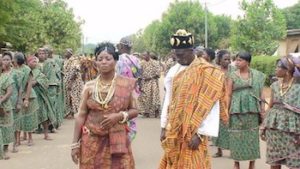
*Grebo people are celebrated on this date in 1822. They are an ethnic group or subgroup within the larger Kru group of Africa, a language and cultural ethnicity, and sure of its constituent elements.
Within Liberia, members of this group are found primarily in Maryland County and Grand Kru County in the southeastern portion of the country, as well as in River Gee County and Sinoe County. The Grebo population in Côte d'Ivoire is known as the Krumen and is found in the southwestern corner of that country. As early European explorers and Americo-Liberian colonists reached the area of Cape Palmas by sea, the first Indigenous group they encountered in Thregionea with whom they established prolonged relations was the Seaside Grebo. The colonists generally referred to them as the Grebo. Without other qualifications, the term Grebo generally refers to this group, which has occupied southwest coastal areas of what is now Liberia.
Considerable ambiguity and imprecision accompany the use of the term Grebo since it is not always clear precisely which group writers or speakers intend to denote. Some ambiguity has evolved historically, as the name was generalized from that of the first group contacted by Americo-Liberian colonists in the area that was settled as Maryland County. As colonists used the term to refer to other, lesser-known groups in inland areas, the term became more imprecise, as such groups often belonged to different language families and ethnicities. The confusion has been perpetuated, as Grebo has been used as a cover term for groups in the area, which is now known by scholars to be different but continues to be classified as the same for convenience.
The numerous subgroups of the large and variegated ethnic group, such as the Kru, are defined by linguists referring to a taxonomy of the languages employed by its members. Although archaeological evidence and oral histories may exist, language classification is often the least confusing frame of reference. The Grebo ethnic group comprises a community of speakers of speech varieties covering an extensive language continuum punctuated by a collection of cultural centers of gravity, usually town clusters. While the affinity of these varieties is apparent, the internal structure of classification is too difficult to delineate with any degree of precision. The indigenous people living at Cape Palmas, who were speakers of Seaside Grebo (since classified by linguists), were the first to have extensive contact with the white-American representatives of the Maryland Colonization Society.
They organized the colonization of what became known as Maryland in Africa by free African Americans, beginning in 1827. The Glebo gained sociopolitical ascendancy over neighboring groups from this period due to their access to Western technology and their alliances with the colonists and Americo-Liberians. A 2001 estimate of the Grebo people in Liberia is approximately 387,000. There are an estimated 48,300 Grebo in Côte d'Ivoire, not counting refugees. Precise numbers are lacking since the civil war displaced many in Liberia in the late 20th and early 21st century.